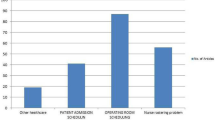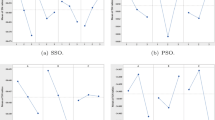Abstract
The primary objective of this research is to solve the job-shop scheduling problems (JSSPs), by minimizing the makespan, with and without process interruptions. In this paper, we first developed a genetic algorithm for solving JSSPs, and then improved the algorithm by integrating it with two simple priority rules and a hybrid rule. The performance of the developed algorithm was tested by solving 40 benchmark problems and comparing their results with that of a number of well-known algorithms. In addition, we have studied the job-shop scheduling under process interruptions such as machine unavailability and breakdown. For convenience of implementation, we have developed a decision support system (DSS). In the DSS, we built a graphical user interface for user friendly data inputs, model choices, and output generation. An overview of the DSS and an analysis of the experimental results are provided. The incorporation of priority rules, and a hybrid rule, not only improves the solutions but also reduces the overall computational time. The experimental results show that when the machine unavailability information is known in advance, the effect on the schedule is very little compared to the sudden machine breakdown scenario.





Similar content being viewed by others
References
Adams J, Balas E, Zawack D (1988) The shifting bottleneck procedure for job shop scheduling. Manage Sci 34:391–401
Biegel JE, Davern JJ (1990) Genetic algorithms and job shop scheduling. Comput Ind Eng 19:81–91
Binato S, Hery WJ, Loewenstern D, Resende MGC (2001) A GRASP for job shop scheduling. In: Ribeiro CC, Hansen P (eds) Essays and surveys on metaheuristics, Kluwer Academic Publishers, Dordrecht, pp 59–79
Blackstone JH Jr, Phillips DT, Hogg GL (1982) A state-of-the-art survey of dispatching rules for manufacturing job shop operations. Int J Prod Res 20(1):27
Croce FD, Tadei R, Volta G (1995) A genetic algorithm for the job shop problem. Comput Oper Res 22:15–24
Dorndorf U, Pesch E (1995) Evolution based learning in a job shop scheduling environment. Comput Oper Res 22:25–40
Eom HB, Lee SM (1990) A survey of decision support system applications (1971-April 1988). Interfaces 20:65–79
Eom SB, Lee SM, Kim EB, Somarajan C (1998) A survey of decision support system applications (1988–1994). J Oper Res Soc 49(2):109–120
Garey MR, Johnson DS, Sethi R (1976) The Complexity of flowshop and jobshop scheduling. Math Oper Res 1:117–129
Goldberg DE (1989) Genetic algorithms in search, optimization, and machine learning. Addison-Wesley Pub. Co, Reading
Hasan SMK, Sarker R, Essam D, Cornforth D (2009) Memetic algorithms for solving job-shop scheduling problems. Memet Comput 1:69–83
Ishibuchi H, Murata T (1998) A multi-objective genetic local search algorithm and its application to flowshop scheduling. Syst Man Cybern C IEEE Trans 28:392–403
Kacem I (2009) Approximation algorithms for the makespan minimization with positive tails on a single machine with a fixed non-availability interval. J Comb Optim 17:117–133
Kacem I, Chu C (2008) Efficient branch-and-bound algorithm for minimizing the weighted sum of completion times on a single machine with one availability constraint. Int J Prod Econ 112:138–150
Kacem I, Haouari M (2009) Approximation algorithms for single machine scheduling with one unavailability period. IEEE T Evolut Comput 7:79–92
Kumar M, Rajotia S (2006) Integration of process planning and scheduling in a job shop environment. Int J Adv Manuf Technol 28:109–116
Lawrence S (1984) Resource constrained project scheduling: an experimental investigation of heuristic scheduling techniques. Graduate School of Industrial Administration, Carnegie-Mellon University, Pittsburgh
Lawrence D (1985) Job shop scheduling with genetic algorithms. In: First international conference on genetic algorithms. Lawrence Erlbaum Associates, Inc., Mahwah, NJ, USA
McKay KN, Buzacott JA (2000) The application of computerized production control systems in job shop environments. Comput Ind 42:79–97
McKay KN, Wiers VCS (2003) Integrated decision support for planning, scheduling, and dispatching tasks in a focused factory. Comput Ind 50:5–14
Nakano R, Yamada T (1991) Conventional genetic algorithm for job shop problems. In: Fourth international conference on genetic algorithms, Morgan Kaufmann, San Mateo, California, pp. 474–479
Ombuki BM, Ventresca M (2004) Local search genetic algorithms for the job shop scheduling problem. Appl Intell 21:99–109
Paredis J (1992) Handbook of evolutionary computation. Parallel problem solving from nature 2. Institute of Physics Publishing and Oxford University Press, Brussels
Paredis J, Back T, Fogel D, Michalewicz Z (1997) Exploiting constraints as background knowledge for evolutionary algorithms. Handbook of Evolutionary Computation. Institute, pp G1.2:1–G1.2:16
Park BJ, Choi HR, Kim HS (2003) A hybrid genetic algorithm for the job shop scheduling problems. Comput Ind Eng 45:597–613
Petrovic D, Duenas A, Petrovic S (2007) Decision support tool for multi-objective job shop scheduling problems with linguistically quantified decision functions. Decis Support Syst 43:1527–1538
Pezzella F, Morganti G, Ciaschetti G (2008) A genetic algorithm for the flexible job-shop scheduling problem. Comput Oper Res 35:3202–3212
Ponnambalam SG, Aravindan P, Rao PS (2001) Comparative evaluation of genetic algorithms for job-shop scheduling. Prod Plan Control 12:560–674
Shigenobu K, Isao O, Masayuki Y (1995) An efficient genetic algorithm for job shop scheduling problems. In: Proceedings of the 6th international conference on genetic algorithms. Morgan Kaufmann Publishers Inc
Silva C, Roque L, Almeida A (2006) MAPP–A web-based decision support system for the mould industry. Decis Support Syst 42:999–1014
Speranza MG, Woerlee AP (1991) A decision support system for operational production scheduling. Eur J Oper Res 55:329–343
Turban E (1993) Decision support systems: an overview. In: Stewart C (ed) Decision support and expert systems: management support systems. Macmillan, New York, pp 83–129
Turban E (2007) Decision support and business intelligence systems. Pearson Prentice Hall, Upper Saddle River
Viviers F (1983) A decision support system for job shop scheduling. Eur J Oper Res 14:95–103
Wang W, Brunn P (2000) An effective genetic algorithm for job shop scheduling. In: Proceedings of the institution of mechanical engineers—part b—engineering manufacture 214, pp 293–300
Wu DS, Storer RH, Pei-Chann C (1993) One-machine rescheduling heuristics with efficiency and stability as criteria. Comput Oper Res 20(1):1–14
Yamada T (2003) Studies on metaheuristics for jobshop and flowshop scheduling problems. Department of Applied Mathematics and Physics. Kyoto University, Kyoto, p 120
Yamada T, Nakano R (1997a) Genetic algorithms for job-shop scheduling problems. In: Modern heuristic for decision support, UNICOM seminar, London, pp 67–81
Yamada T, Nakano R (1997b) Job-shop scheduling. In: Zalzala AMS, Fleming PJ (eds) Genetic algorithms in engineering systems. The Institution of Electrical Engineers, London, pp 134–160
Author information
Authors and Affiliations
Corresponding author
Rights and permissions
About this article
Cite this article
Hasan, S.M.K., Sarker, R., Essam, D. et al. A DSS for job scheduling under process interruptions. Flex Serv Manuf J 23, 137–155 (2011). https://doi.org/10.1007/s10696-011-9094-3
Published:
Issue Date:
DOI: https://doi.org/10.1007/s10696-011-9094-3




